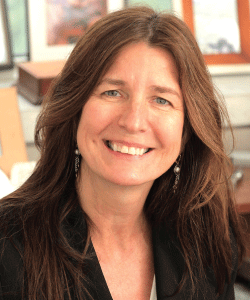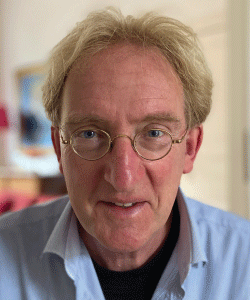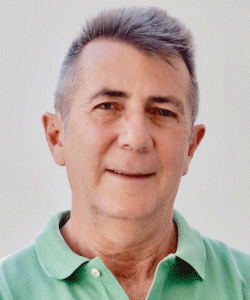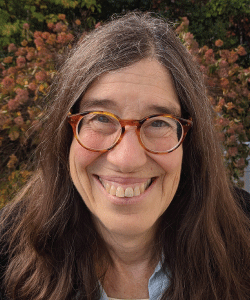APS Spotlight
2021 APS Mentor Awards

The APS Mentor Awards recognize psychology researchers and educators who have shaped the future directions of science by fostering the careers of students and colleagues. Four APS Fellows have been selected to receive the award in 2021. Beyond their individual contributions to diverse areas of research, these scholars’ dedication to their students and colleagues has helped to foster a thriving global community of psychological scientists.
Learn more about the APS Mentor Awards.

BJ Casey
Yale University, United States
APS Fellow BJ Casey is internationally renowned for her groundbreaking contributions to developmental neuroscience, including the first-ever fMRI study on the healthy developing brain. Among her many accomplishments is a stunning number of incredibly successful trainees who have gone on to hold faculty positions at prestigious institutions and establish highly productive research programs.
She is known for her exceptional generosity, mentoring not only those in her own lab but many others from her institution and elsewhere, finding time for each of her mentees despite her busy schedule. Her nominators Dylan Gee of Yale and Catherine Hartley of New York University—both APS Fellows and recipients of the APS Janet Taylor Spence Award for transformative early-career contributions—recall working as Casey’s postdoc advisees: “Though her lab had numerous projects to which we could have contributed, BJ selflessly challenged us to develop our own independent lines of research as postdoctoral fellows, which she then supported with her intellectual insights, financial support, staff time, and physical lab space.”
Casey is beloved for her moral support and enthusiastic celebration of every success, no matter how small—and she doesn’t stop championing her mentees after they leave her lab.
Casey has also made it a priority to support women and those of underrepresented racial and ethnic backgrounds, including as an enthusiastic participant in programs that target training diverse scientists, such as The ACCESS Summer Internship Program at Weill Cornell Graduate School and Yale’s Justice Collaboratory and Pathways to Science programs.
Video profiles with these and other recipients of the 2021 APS Lifetime Achievement Awards will be available through the Virtual Convention platform and on the APS website after May 27.
Casey’s students credit her with having a unique understanding of their needs. She strikes the perfect balance between offering guidance and promoting independence, allowing students to mature into thoughtful scientists. She supports her students not only in their research but also in their other interests, such as teaching and outreach. In addition to offering her knowledge and connections, Casey is beloved for her moral support and enthusiastic celebration of every success, no matter how small—and she doesn’t stop championing her mentees after they leave her lab. “To this day,” wrote Casey’s former graduate student Adriana Galván, now a professor at the University of California, Los Angeles, and an APS Fellow, “she reminds colleagues of results I published over a decade ago, and I know she does so for my peers as well.”
Whether serving as a role model, advising and encouraging her mentees, or making sure that her colleagues are aware of their innovative work, Casey has had an invaluable impact. There is no doubt that the field of developmental neuroscience has been significantly expanded thanks to Casey and her tireless mentorship of the next generation of psychological scientists.

Harald Merckelbach
Maastricht University, the Netherlands
APS Fellow Harald Merckelbach is known for his study of memory distortions, including amnesia and confabulation. He has published hundreds of articles in top journals of the field. As his work has important implications for the legal system, he has served as a member of the Dutch Advisory Committee on Closed Criminal Cases. In addition to these accomplishments, he is an extraordinary mentor, continually going above and beyond to help his mentees think critically about important issues and build successful careers.
Ineke Wessel, a professor at the University of Groningen, recalls that when she began her PhD in the early 1990s, a public debate about recovered memories was emerging in the Netherlands. Recognizing the significance of this event, Merckelbach not only engaged in the debate but invited Wessel to get involved, too. “This collaboration has influenced my thinking profoundly,” Wessel wrote. Today, as a professor, Wessel prioritizes teaching “clinicians about the reconstructive nature of memory and the questionable nature of concepts like repression, body memories, and preverbal trauma.”
Merckelbach’s students frequently find that his timely and detailed feedback elevates their work beyond their initial expectations, broadening their experience as scientists in the process.
Merckelbach’s enthusiasm inspires his mentees not only to produce high-quality research but also to enjoy the process. He is appreciated for his impressive erudition, which allows him to connect seemingly unrelated literatures and thereby generate new interdisciplinary perspectives and research questions. His students frequently find that his timely and detailed feedback elevates their work beyond their initial expectations, broadening their experience as scientists in the process—a quality that former students cherish and strive to emulate for their own mentees years later.
Rather than using his position of authority to dominate conversations, Merckelbach treats his students as colleagues. By defending strong opinions while remaining open to other ideas, he constantly engages his students in intellectual debate that pushes them to grow as scholars.
Merckelbach also has a keen eye for opportunities suited for his mentees, whether research, co-authorship of articles or book chapters, or networking experiences, such as conferences. “He has no intellectual jealousy,” said former mentee Tom Smeets, now head of the Department of Medical and Clinical Psychology at Tilburg University. “He is always happy to see others succeed, to give other people the spotlight while standing back in the shadows himself.” He stays in touch with each of his mentees, often becoming a lifelong collaborator. Merckelbach’s many successful mentees thank him for his indispensable guidance and support.

Miguel Moya
University of Granada, Spain
When APS Fellow Miguel Moya began his career, he had few Spanish colleagues in social psychology. Further, in the shadow of Francisco Franco’s dictatorship, prejudice in particular was an understudied topic in the country. Over the following decades, Moya worked tirelessly to establish social psychology as a respected academic discipline in Spain and embraced the study of prejudice and marginalization.
Moya’s former advisee Ginés Navarro Carrillo, now an assistant professor at Universidad de Jaén (Spain), credits Moya’s “rigorous, socially engaged, and dedicated work” as “a model not only [for] myself, but also a whole generation of young researchers.” Indeed, for some of Moya’s mentees, his engaging undergraduate lectures inspired a lifelong career in the empirical study of human behavior.
Moya advocates for scientists producing high quality social psychology research to be recognized and rewarded, and he reaches across international and disciplinary lines to form highly productive networks of collaboration.
Moya advocates for scientists producing high-quality social psychology research to be recognized and rewarded, and he reaches across international and disciplinary lines to form highly productive networks of collaboration. As a result of these values, his students are instilled with a deep appreciation for the importance of teamwork and collaboration.
He makes frequent introductions and encourages students to share their ideas, prioritize attendance at conferences, and form professional relationships that often lead to fruitful collaborations in the future. Soledad de Lemus, an associate professor at the University of Granada who was Moya’s doctoral student, remembers that “Miguel promoted me and encouraged me to travel abroad, learn new techniques, and develop strong networking abilities that have been fundamental in my career.”
Moya excels at promoting a sense of community. “HUM289,” the administrative designation of his research group, has become a sort of group identity, with its members feeling proud to be involved in its important work regarding discrimination and stigma. Not least among the reasons his students so value their work with him is Moya’s kind and brilliant leadership. “Miguel has always taken extraordinary care of the student he has supervised… at the research but also the interpersonal level,” wrote Rosa Rodríguez-Bailón, now a professor at the University of Granada. His students cherish him for his understanding, humility, warmth, and willingness to help in any way that might further a young scientist’s career, going far beyond his explicit responsibilities.
Moya is a professor in the Department of Social Psychology at the University of Granada. He continues to enthusiastically promote the study of social psychology in every way possible.

Elizabeth Spelke
Harvard University, United States
APS William James Fellow Elizabeth Spelke is known for her incisive analysis of foundational questions about the origins and growth of human knowledge, and she eagerly shares her rich intellectual life with her mentees. Her enthusiasm for science is infectious, and she helps her students to stay motivated by always being ready to engage them in thoughtful conversation. Spelke expertly tailors her approach for each mentee, helping those who already have ideas to formulate concrete research plans while giving others the time and resources needed to spark inspiration.
Spelke teaches her students to develop strict experimental designs that pinpoint important variables. Her keen, curious mind and skill as an experimentalist are incredible assets to her mentees. APS Fellow Fei Xu, a professor at the University of California, Berkeley, who met Spelke as a graduate student more than 25 years ago and went on to work under her supervision as a postdoctoral fellow, recalls that at the time, graduate students would joke that “Liz comes up with a whole dissertation worth of experiments while brushing her teeth in the morning. Every morning!”
Spelke’s remarkable generosity with her mentees sets her apart as a scientist truly dedicated to fostering the next generation of innovative researchers.
In addition to this incredible passion for scientific inquiry, Spelke avidly seeks out opportunities for her mentees to lead and travel, willingly stepping aside when doing so is in her protégés’ best interest. Nominator Kristin Shutts, a professor at the University of Wisconsin–Madison, wrote that “On several occasions, I have watched Liz step back from a line of research started by a mentee in her lab so that the mentee has a chance to grow and garner independent recognition.”
At every turn, Spelke gives of herself to ensure the success of her mentees, whether that means staying awake late into the night to perfect a mentee’s conference poster or making time to serve as the inaugural speaker for a former student’s talk series.
Spelke inspires her mentees to believe in and advocate for themselves, leading them to secure prestigious positions and make significant advances in cognitive and developmental psychology. She maintains contact with each of her mentees, ensuring that they continue to benefit from her support while also creating a network of similarly trained scientists poised for collaboration. Spelke’s remarkable generosity with her mentees sets her apart as a scientist truly dedicated to fostering the next generation of innovative researchers.
Moira Dillon, an assistant professor at New York University, considers Spelke the quintessential professor: “She is able to profess not just her knowledge but also her passion for the human mind—indeed, for every human mind.”





APS regularly opens certain online articles for discussion on our website. Effective February 2021, you must be a logged-in APS member to post comments. By posting a comment, you agree to our Community Guidelines and the display of your profile information, including your name and affiliation. Any opinions, findings, conclusions, or recommendations present in article comments are those of the writers and do not necessarily reflect the views of APS or the article’s author. For more information, please see our Community Guidelines.
Please login with your APS account to comment.